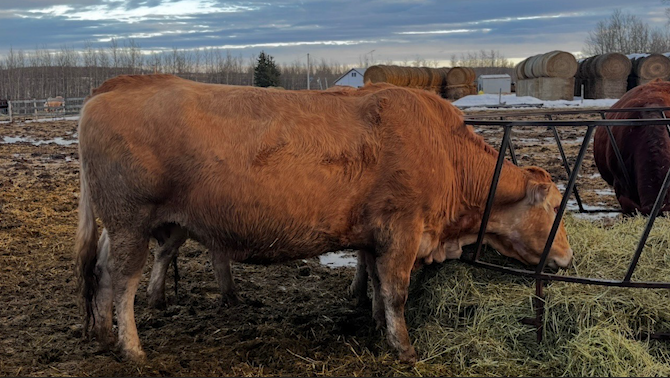A Peace Region rancher is raising concerns about the impact fracking is having on the livelihood of farmers in the Peace Region.
Shellie Wolfe is urging the BC Energy Regulator (BCER) to revise their guidelines and provide better support for producers. She claims that a series of incidents have gone unaddressed, compelling her to significantly reduce the size of her cattle herd.
“They basically just tell me that they’re following the regulations. I’ve told them many times that they need to update the regulations because this isn’t working for us farmers,” said Wolfe.
The comments come after CJDC-TV aired a story about another Peace Region farmer calling out the BCER after fracking-caused earthquakes caused premature calf births. Wolfe says the disturbance from well drilling, equipment trucks, and fracking is stressing her cattle. She claims that a lease operated by energy company Vermillion has caused cows to lose calves in the first seven to ten days and the quality of bull semen to drop – effecting her livelihood.
“Financially, it hurts because I don’t have that big income. It makes it really hard to make ends meet,” Wolfe told CJDC-TV. “We should have a say when something’s happening to our livestock.”
Wolfe insists she isn’t against oil and gas, but what current regulations are doing to farmers. She says that because she’s outside the notification area, the BCER won’t act, and she hasn’t been contacted about an emergency response plan.
“It affects me because my animals are right beside that lease in the summertime and BCER won’t do anything -- I’ve told them,” Wolfe said.
However, disturbance isn’t the only issue causing havoc at Silver Wolfe Farms in Doe River -- a farming community nestled on the B.C. Alberta border -- approximately 30 minutes north of Dawson Creek.
She wants the BCER and the Provincial Agricultural Land Commission (ALR) to provide a solution for an incident that sees her water source drying up. According to Wolfe, a neighboring property that holds a water license is blocking access to Mica Creek by building a trench that funnels water to a dugout which is then sold to Vermillion for fracking operations.
She is not only questioning the legality of blocking the creek, but the issue combined with record drought in the area over the past several years, has significantly impacted the quality of grass for grazing.
“Two years we’ve been in a record drought and us farmers -- all of our dugouts are low. I know people that had to sell their cows because they had no water last fall but yet somehow this big dugout gets full just in time for the fracks to happen,” said Wolfe.
Wolfe says the BCER and the ALR have been made aware of what’s happening.
The BCER notes that they are committed to sustainable water management and prioritize protecting environmental and community water needs. Companies that withdraw water through licenses or short-term use approvals must regularly report the volume and source basin of the water. Water activities for hydraulic fracturing are also required to be reported.
In 2024, Vermillion received approval from the BCER to install water pumping infrastructure for short-term water use. Above-ground hoses and pumps will transport water from the Peace River to their operations.
The ALR also outlines strict guidelines for reporting unauthorized land use and following up with alleged non-compliance.
“I’m going to have two leases that they’re going to be fracking just over half a mile away from me… you know, like, it’s frustrating. It’s very frustrating,” said Wolfe, who despite the circumstance says she doesn’t have it in her to give up on the farm.
